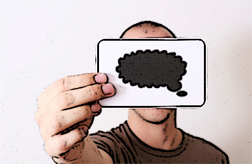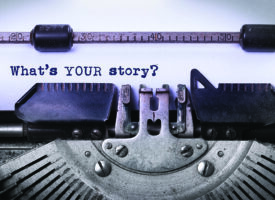 One of the most frequent questions writers ask themselves is, “What should I write about?”
One of the most frequent questions writers ask themselves is, “What should I write about?”
One editor of my university’s literary magazine says, “If I knew what to write, I would write about it myself.” The logic of his reply makes my question kind of absurd.
Choose a Specialty
I have heard one answer that may help. “Choose a specialty.” Your own hobby is usually the best subject; but if you do not have a hobby, the next best subject is your own imagination.I am surprised at how much an author can write on any topic. A charming essay from one of the online literary magazines was made up on the basis of a single Hallmark greeting card. The writer began the article by describing a railway journey with nothing to do, nothing to read, and no one with whom he could talk. Searching his pockets revealed a simple greeting card, containing three names. This writer, from his knowledge of English language and history, built a concrete, entertaining story about the three names on that card.
 Of course, few writers can yank ideas out of their own heads and twist and shape them into stories; but books are cheap and the Internet is free, so you really have no excuse not to come up with material. Have you ever sat leisurely at your library or local book store and stared at all of the books around you? I find it breathtaking. All these books represent the writing of a chosen subject about which the author knew (at the start) little more than his readers.
Of course, few writers can yank ideas out of their own heads and twist and shape them into stories; but books are cheap and the Internet is free, so you really have no excuse not to come up with material. Have you ever sat leisurely at your library or local book store and stared at all of the books around you? I find it breathtaking. All these books represent the writing of a chosen subject about which the author knew (at the start) little more than his readers.
When subjects excite your curiosity, make a note of it. Draw an image of it. Write a blog post about it. Tweet it. Dream about it at night. Before long, you will have your own prized collection of story ideas.
Spark Your Imagination
My 10 year old son’s creative writing teacher has her students flip through an encyclopedia to spark their imaginations. She tells her students to think about one “thing” that interests them, then use one word to describe that interest and look it up in the encyclopedia. Here, under A, is Abbey, Almanac, Abbreviations, Admiral, Agrarian laws, Alderman, Aztecs, Asylums. Anything you please! Whatever one topic that you begin to study will either prove a good subject or a dull one.
If you enjoy verse or writing poetry, consider staring at mind maps. I gaze at them and creativity flows from me. Mind maps are just what they sound like: maps of an individual’s creative thoughts connecting to more thoughts. Try it for yourself: go to http://www.biggerplate.com/. At this website you can find mind maps in many creative categories to stir your thought process.
 In any event, you begin the actual writing process as soon as you seek to acquire something to say. Writing, like drawing, is a method of expression. The first step in each art is something to express.
In any event, you begin the actual writing process as soon as you seek to acquire something to say. Writing, like drawing, is a method of expression. The first step in each art is something to express.
Suppose your friend wants to learn to act, and says, “I believe I could act, but I haven’t anything to act.” It is absurdly parallel to the plight of any writer who asks, “What should I write about?”
Write About Anything, Even For Practice
Find something to write about. Write the story of the Titanic; the story of our economic recession; the story of paranormal activity in your house—anything for practice! But don’t try to sell this practice work, as it may be just a rambling of creative thoughts (and that is okay!).
If you can’t think about a subject upon which to write, then select a topic that nobody knows much about, and try to educate yourself about it. Investigating unusual topics will furnish unique and odd ideas; research will give knowledge, knowledge will seek sound and sound is the raw material of great story writing. Precious moments of conscious thoughts free the imagination—and all novelists clamor for this state of mind.
 The upshot is this: You will never write anything until you decide what to write about. Almost any subject will do because it will lead to another, or clear the way for it. When you have decided on a subject, study it until you are a specialist on that subject, compared with the reading public. Then decide what you want to say about it, and write that out plainly. You do not have to write descriptively for now; you can go over your writing later and amplify and modify your words. Write no more than what you have to say, even if your creativity compels you to write a paragraph where you hoped to create a book.
The upshot is this: You will never write anything until you decide what to write about. Almost any subject will do because it will lead to another, or clear the way for it. When you have decided on a subject, study it until you are a specialist on that subject, compared with the reading public. Then decide what you want to say about it, and write that out plainly. You do not have to write descriptively for now; you can go over your writing later and amplify and modify your words. Write no more than what you have to say, even if your creativity compels you to write a paragraph where you hoped to create a book.



